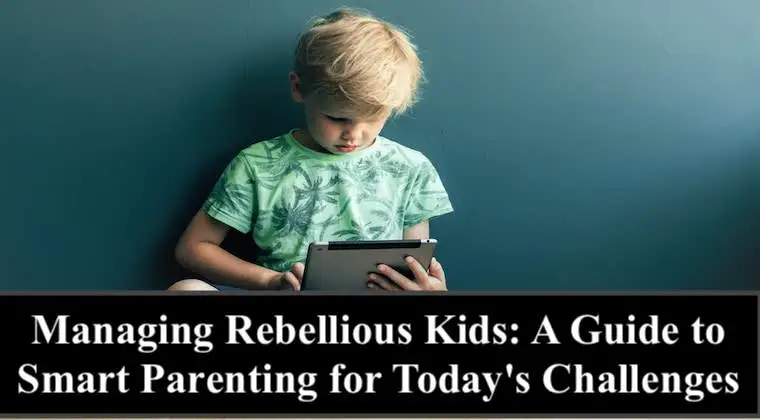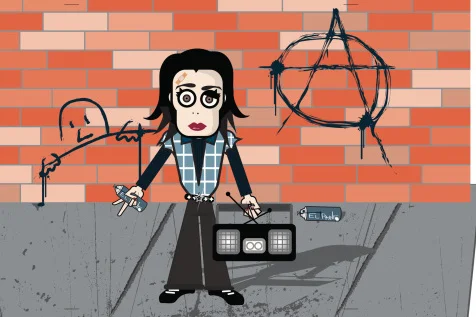+1 845 259 2974 (11 a.m to 7 p.m CST)
Managing Rebellious Kids: A Guide to Smart Parenting for Today's Challenges

If you have kids who are in their tweens or teens, there are hundred percent chance that they might become alien to you soon. Or if that has already happened, you might be worried for them. They don’t care what is happening around you anymore, they don’t care about your opinion, at worst, they have developed a life that is devoid of your existence. In such cases, parents often lose hope and end up doing a lot of wrong things. We will get into those bad parenting habits in a while.
First, let’s understand why are your kids not listening to your anymore and if there are any chances of smart parenting to work. Being rebellious is sometimes out of their control. They don’t know how to respond to the changes that they are going through. They are facing emotional, physical, mental, and external changes that they don’t know how to deal with.
On top of all the things that they are experiencing, they also don’t know what to do with the technology which is becoming very common day by day. They know that they can’t just ignore it, because all their friends are enjoying it and forcing them to do the same, and they want to explore it too. But, all of this doesn’t go well always. It often increases the rebellious nature thus leaving parents more worried. Let’s get on with this guide to smart parenting for today’s challenges.
Why do Kids Become Rebellious?
The teenage years are a period of significant change and growth, both physically and mentally. Several factors contribute to the emergence of rebellious behavior during this phase:
- Physical and Hormonal Changes: Adolescence brings a wave of hormonal changes associated with puberty. These hormonal shifts can cause mood swings and heightened emotions, which can often manifest as rebellious behavior.
- Development of Personal Identity: Teens are in the process of figuring out who they are and where they fit into the world. This exploration of self-identity often involves questioning established rules and norms, which can lead to rebellion.
- Quest for Independence: As teenagers mature, they start to crave more independence. They may challenge their parents' control in an attempt to assert their autonomy, leading to conflicts and perceived rebelliousness.
- Peer Influence: During the teenage years, peers become increasingly important. The desire to fit in can sometimes lead teenagers to adopt behaviors and attitudes that are in direct opposition to their parent's expectations or societal norms.
- Cognitive Development: Teenagers are developing abstract thinking skills, allowing them to question authority and challenge the status quo. This newfound cognitive ability can often come across as rebellious.
- Risk-taking Behavior: The area of the brain responsible for impulse control, the prefrontal cortex, isn't fully developed until the mid-twenties. Consequently, teenagers are more prone to engage in risk-taking behavior, which adults may interpret as rebellious.
If we could understand that this is what the kids are going through, we might be able to handle them more gracefully.
Teenage Rebellious and Internet
Not to forget, the internet and social media are actively playing a role in the development of kids. Not only kids are confused about the right use of social media, but they are also doing it wrong in many ways just to fit in.
Technology can contribute to rebellious behavior in kids in several ways:
- Exposure to new ideas: The internet exposes children to a wide range of thoughts, ideas, and cultures. Sometimes, these ideas may challenge the norms, rules, and values established by their parents or society, leading to disagreements and rebellion.
- Peer pressure online: Social media platforms can lead to increased peer pressure. Kids may be influenced by what their peers are doing online and may start to imitate these behaviors, even if they contradict their parents' rules.
- Increased independence: Technology often provides kids with a sense of independence and private space that is not always accessible to their parents. This can sometimes lead them to believe they can make decisions without consulting their parents, leading to rebellious actions.
- Overuse and addiction: Overuse of technology, like video games and social media, can lead to addiction. When parents try to control the use, kids may react with defiance and rebel against these limitations.
- Online anonymity: Technology provides a level of anonymity that might encourage kids to experiment with behaviors they wouldn't try in real life. If parents attempt to curb this, it could lead to rebellious behavior.
So, what should parents do? Should they leave their kids to social media or should they stop them from using it at all? Neither is a good option.
What do Parents Do to Contribute to the Rebellious Nature of Kids?
Yes, you read it right. No matter what your interests are, you might be thinking that you are doing what’s best for them, but at the same time, you might be contributing to their wrong side of nature. Here is what you are doing wrong:
- Inconsistent Rules and Discipline: Lack of consistency in rules and their enforcement can confuse children, leading them to act out or test boundaries.
- Overly Strict Control: Overbearing control can stifle a child's need for independence, causing them to rebel to assert their autonomy.
- Lack of Open Communication: If children feel they can't discuss their thoughts, feelings, or concerns with their parents, they may rebel to express their frustration or to get their parent's attention.
- Unrealistic Expectations: Setting unattainable standards or goals for children can lead to feelings of pressure and inadequacy, which can in turn cause children to rebel.
- Lack of Emotional Responsiveness: If parents don't adequately respond to their child's emotional needs, it can create feelings of neglect, leading to rebellious behavior as a form of protest or a way to seek attention.
- Poor Role Modeling: Parents are a child's first and most significant role models. Displaying rebellious behavior, unresolved conflict, or lack of respect for rules and authority can inadvertently teach children to do the same.
How can Smart Parenting Help?
Did you just realize that you might be practicing all or a few of the above things in your parenting? If yes, then it is still not too late to do things better right now. Your kids need you but you are not there for them instead you are bashing them at every level of their growth. You are putting restrictions on them which isn’t helping.
This guide to smart parenting for today’s challenges is all about understanding their needs, knowing what they are going through, letting them use the internet as they wish, but at the same time, getting acquainted with it too. Here are some of the basics of smart parenting:
- You need to have open communication with them. You need to let them share whatever they want, even if it is the worst of their mistakes. Show them that it is fine and they can confide in you. Never bash them for sharing too much.
- Use parental controls to make sure you know what is going on with them on the internet. Never let them go free on social media but do not suffocate them either. Be there for them if anything goes wrong, and make sure that they have their independence too. Either way, you need a good and trustworthy parental control app by your side. And there is nothing better than Secureteen that can promise you your kids’ safety and protection.
- Learn internet and social media on your own so that you can talk to them about the things they like. These days, kids are all about social media and if you are on the same page as them, they might not talk to you at all. But don’t be too invasive.
- Spend time with them where you can share a few things with them and in return, you shouldn’t expect anything. That is how it will go for a while until they come to you for help/communicate on their own.
Smart parenting isn’t difficult, instead, it can protect your kids and have you in their life forever. Otherwise, it takes no time to turn them into strangers at home. So, infuse this guide to smart parenting for today’s challenges in your parenting pattern from today, to create a bonding with your kids and protect them as well.


















